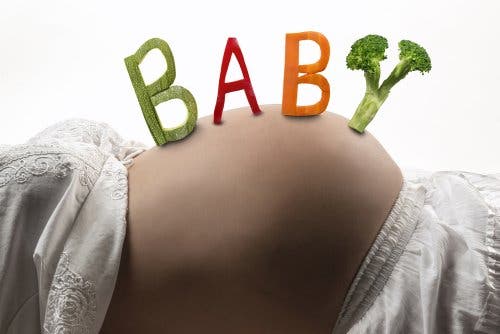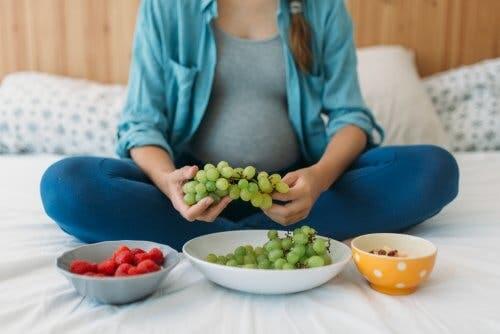The Right Diet for Increasing a Woman's Fertility

If you’re trying to get pregnant, it’s important to maintain a healthy diet that’s rich in certain nutrients. And that’s exactly why we want to help you know what foods and other factors are important when it comes to increasing a woman’s fertility.
The right diet for increasing a woman’s fertility
Infertility problems are becoming more and more common. Lifestyle changes, including sedentarism and poor nutrition, are factors that have a direct influence on the functioning of our reproductive system. Other factors that we must also take into account are stress and excess toxins.
Fertility and weight
One of the main causes of the increase in infertility among women is our weight. And that’s true both for women who are overweight as well as those who are underweight. Therefore, it’s just as important to eat healthy as it is to maintain a proper hormonal balance. Both are essential when it comes to having an ideal weight for conception.
Excess weight and obesity
Body fat is necessary when it comes to the production of reproductive hormones. For that reason, excess weight can modify the hypothalamic-pituitary-adrenal axis and cause alternations in the menstrual cycle. What’s more, hormonal disorder and infertility are common when it comes to polycystic ovary syndrome (PCOS).

Being underweight
Low weight can also contribute to infertility, comprising the functioning of the pituitary hormones (FSH and LH). These hormones are responsible for regulating the ovulatory cycle. So, being underweight can cause menstruation and ovulation to cease. This is often the case of women who suffer from eating disorders.
The role of nutrition
Proper nutrition is fundamental when it comes to increasing a woman’s fertility. This means maintaining a diet that’s rich in fiber and omega 3 and maximizing certain nutrients. It also means avoiding sugar, salt, and alcohol.
Macronutrient consumption
- Carbohydrates
The type of carbohydrates we consume as well as the amount can affect our fertility. Research has shown that following a diet that’s rich in foods with a low glycemic load can be helpful for increasing a woman’s fertility. This improvement is related to ovulation through an improvement in a woman’s sensitivity to insulin.
- Proteins
In regard to proteins, research has shown that replacing animal proteins with plant-based proteins improves ovulation. In a study published in the American journal of obstetrics and gynecology, researchers noted that the risk of infertility due to anovulation decreased in more than 50% of women that followed a diet where 5% of their total energy came from plant-based proteins.
- Fats
When it comes to fats, they have a negative effect on fertility. Trans fats increase the resistance to insulin and thereby increase the risk of alternations in a woman’s ovulation. However, monounsaturated and polyunsaturated fats tend to have a positive effect on fertility.
The role of vitamins and minerals
- Folic acid and vitamin B12
Group B vitamins are necessary when it comes to cellular division and in preventing possible neural tube problems in babies. Therefore, we should increase our intake by consuming brewer’s yeast, green leafy vegetables (chard, spinach, etc), legumes, dry nuts, enriched breakfasts cereals, etc.
- Vitamin A and carotenes
This vitamin and its precursors are essential in the correct functioning of diverse mucous membranes in the body. Among them, the mucous membrane of the uterus where the fertilized ovule needs to be implanted. At the same time, these vitamins also affect the menstrual cycle and the development of the placenta. We can find them in red and orange-colored fruits and vegetables.
- Vitamin D
Vitamin D is associated with maintaining the ovarian reserve because it contributes to the synthesis of the anti-Müllerian hormone. In women, a lack of vitamin D can cause resistance to insulin, PCOS, and uterine myomas (fibroids). The factor in vitamin D levels is getting enough exposure to the sun. However, this vitamin is also found in food sources like egg yolks, dairy produces, and oily fish, mainly.

More vitamins and minerals that play a role in fertility
- Vitamin E
Vitamin E is fundamental to reproduction given its antioxidant properties. Furthermore, it facilitates the implantation of the fertilized egg. At the same time, vitamin E is necessary for the development and function of the placenta. We can find it in vegetable oils and dry nuts.
- Iron
Iron favors ovulation and aids in the implantation of the fertilized egg. What’s more, it reduces the risk of developing complications at the beginning of pregnancy. It’s also fundamental to the growth and development of the fetus’ nervous system. Foods that contain iron are meats, fish, legumes, dry nuts, eggs, and vegetables like spinach, asparagus, and green beans.
- Zinc
This mineral plays a role in both ovulation and fertilization. And, during pregnancy, zinc deficiency can produce a variety of anomalies, including miscarriage. As an antioxidant, it can help delay cellular and follicular aging, thus increasing a woman’s fertility. We can find zinc in pork, wholegrain rice, dark chocolate, etc.
Finally, we should mention that maintaining proper nutrition isn’t just important for women. It also plays an important role in male fertility.
If you’re trying to get pregnant, it’s important to maintain a healthy diet that’s rich in certain nutrients. And that’s exactly why we want to help you know what foods and other factors are important when it comes to increasing a woman’s fertility.
The right diet for increasing a woman’s fertility
Infertility problems are becoming more and more common. Lifestyle changes, including sedentarism and poor nutrition, are factors that have a direct influence on the functioning of our reproductive system. Other factors that we must also take into account are stress and excess toxins.
Fertility and weight
One of the main causes of the increase in infertility among women is our weight. And that’s true both for women who are overweight as well as those who are underweight. Therefore, it’s just as important to eat healthy as it is to maintain a proper hormonal balance. Both are essential when it comes to having an ideal weight for conception.
Excess weight and obesity
Body fat is necessary when it comes to the production of reproductive hormones. For that reason, excess weight can modify the hypothalamic-pituitary-adrenal axis and cause alternations in the menstrual cycle. What’s more, hormonal disorder and infertility are common when it comes to polycystic ovary syndrome (PCOS).

Being underweight
Low weight can also contribute to infertility, comprising the functioning of the pituitary hormones (FSH and LH). These hormones are responsible for regulating the ovulatory cycle. So, being underweight can cause menstruation and ovulation to cease. This is often the case of women who suffer from eating disorders.
The role of nutrition
Proper nutrition is fundamental when it comes to increasing a woman’s fertility. This means maintaining a diet that’s rich in fiber and omega 3 and maximizing certain nutrients. It also means avoiding sugar, salt, and alcohol.
Macronutrient consumption
- Carbohydrates
The type of carbohydrates we consume as well as the amount can affect our fertility. Research has shown that following a diet that’s rich in foods with a low glycemic load can be helpful for increasing a woman’s fertility. This improvement is related to ovulation through an improvement in a woman’s sensitivity to insulin.
- Proteins
In regard to proteins, research has shown that replacing animal proteins with plant-based proteins improves ovulation. In a study published in the American journal of obstetrics and gynecology, researchers noted that the risk of infertility due to anovulation decreased in more than 50% of women that followed a diet where 5% of their total energy came from plant-based proteins.
- Fats
When it comes to fats, they have a negative effect on fertility. Trans fats increase the resistance to insulin and thereby increase the risk of alternations in a woman’s ovulation. However, monounsaturated and polyunsaturated fats tend to have a positive effect on fertility.
The role of vitamins and minerals
- Folic acid and vitamin B12
Group B vitamins are necessary when it comes to cellular division and in preventing possible neural tube problems in babies. Therefore, we should increase our intake by consuming brewer’s yeast, green leafy vegetables (chard, spinach, etc), legumes, dry nuts, enriched breakfasts cereals, etc.
- Vitamin A and carotenes
This vitamin and its precursors are essential in the correct functioning of diverse mucous membranes in the body. Among them, the mucous membrane of the uterus where the fertilized ovule needs to be implanted. At the same time, these vitamins also affect the menstrual cycle and the development of the placenta. We can find them in red and orange-colored fruits and vegetables.
- Vitamin D
Vitamin D is associated with maintaining the ovarian reserve because it contributes to the synthesis of the anti-Müllerian hormone. In women, a lack of vitamin D can cause resistance to insulin, PCOS, and uterine myomas (fibroids). The factor in vitamin D levels is getting enough exposure to the sun. However, this vitamin is also found in food sources like egg yolks, dairy produces, and oily fish, mainly.

More vitamins and minerals that play a role in fertility
- Vitamin E
Vitamin E is fundamental to reproduction given its antioxidant properties. Furthermore, it facilitates the implantation of the fertilized egg. At the same time, vitamin E is necessary for the development and function of the placenta. We can find it in vegetable oils and dry nuts.
- Iron
Iron favors ovulation and aids in the implantation of the fertilized egg. What’s more, it reduces the risk of developing complications at the beginning of pregnancy. It’s also fundamental to the growth and development of the fetus’ nervous system. Foods that contain iron are meats, fish, legumes, dry nuts, eggs, and vegetables like spinach, asparagus, and green beans.
- Zinc
This mineral plays a role in both ovulation and fertilization. And, during pregnancy, zinc deficiency can produce a variety of anomalies, including miscarriage. As an antioxidant, it can help delay cellular and follicular aging, thus increasing a woman’s fertility. We can find zinc in pork, wholegrain rice, dark chocolate, etc.
Finally, we should mention that maintaining proper nutrition isn’t just important for women. It also plays an important role in male fertility.
All cited sources were thoroughly reviewed by our team to ensure their quality, reliability, currency, and validity. The bibliography of this article was considered reliable and of academic or scientific accuracy.
- Chavarro, J. E., Rich-Edwards, J. W., Rosner, B. A., & Willett, W. C. (2008). Protein intake and ovulatory infertility. American journal of obstetrics and gynecology, 198(2), 210-e1.
- González-Rodríguez, L. G., López-Sobaler, A. M., Perea Sánchez, J. M., & Ortega, R. M. (2018). Nutrición y fertilidad. Nutrición Hospitalaria, 35.
- Kimmel, M. C., Ferguson, E. H., Zerwas, S., Bulik, C. M., & Meltzer‐Brody, S. (2016). Obstetric and gynecologic problems associated with eating disorders. International journal of eating disorders, 49(3), 260-275.
This text is provided for informational purposes only and does not replace consultation with a professional. If in doubt, consult your specialist.








